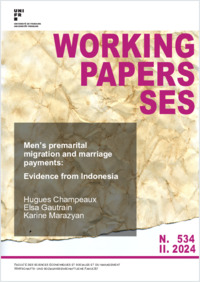Men’s premarital migration and marriage payments: Evidence from Indonesia
BP2-STS
- Champeaux, Hugues ORCID University of Cagliari, University of Namur
- Gautrain, Elsa ORCID University of Fribourg, Global Labor Organization, IC Migrations, UMR Développement et Sociétés (IRD-Paris 1 Sorbonne)
- Marazyan, Karine ORCID Université de Rouen, LASTA, IC Migrations, UMR Développement et Sociétés (IRD-Paris 1 Sorbonne)
- 2024
31 p.
English
Bride price customs are widespread in many developing countries. While the economic literature has widely investigated the implications of such transfers on women’s welfare, little is known about their consequences on men’s premarital behavior. In this paper, we exploit a quasi-natural experiment of a school-building program in Indonesia (INPRES) to investigate the relationship between marriage norms and the internal migrations of young men in age to marry. Based on empirical and theoretical settings of the literature, we rely on the effects of the INPRES program on girls’ education and the parents’ expectations on their daughters’ bride price. Combining anthropological, administrative, and individualbased datasets, we implement a triple-difference approach. We find that men with bride price customs were more likely to migrate to areas more economically attractive than their district of origin. In contrast, no evidence exists of such behavior for men from ethnic groups without marriage payments. We interpret these results as evidence for the fact that men migrate to accumulate resources at destination to meet the parents’ bride price expectations and marry at home. We also highlight that these migration strategies are implemented by the less advantaged males in their origin marriage market (latter-borns or from lower social class). These findings suggest that the interaction between marital norms and policies can result in unintended consequences, such as increasing premarital migration.
- Collections
- Faculty
- Faculté des sciences économiques et sociales et du management
- Language
-
- English
- Classification
- Economics
- Series statement
-
- Working Papers SES ; 534
- License
-
License undefined
- Persistent URL
- https://folia.unifr.ch/unifr/documents/327889
Statistics
Document views: 266
File downloads:
- WP_SES_534: 333
